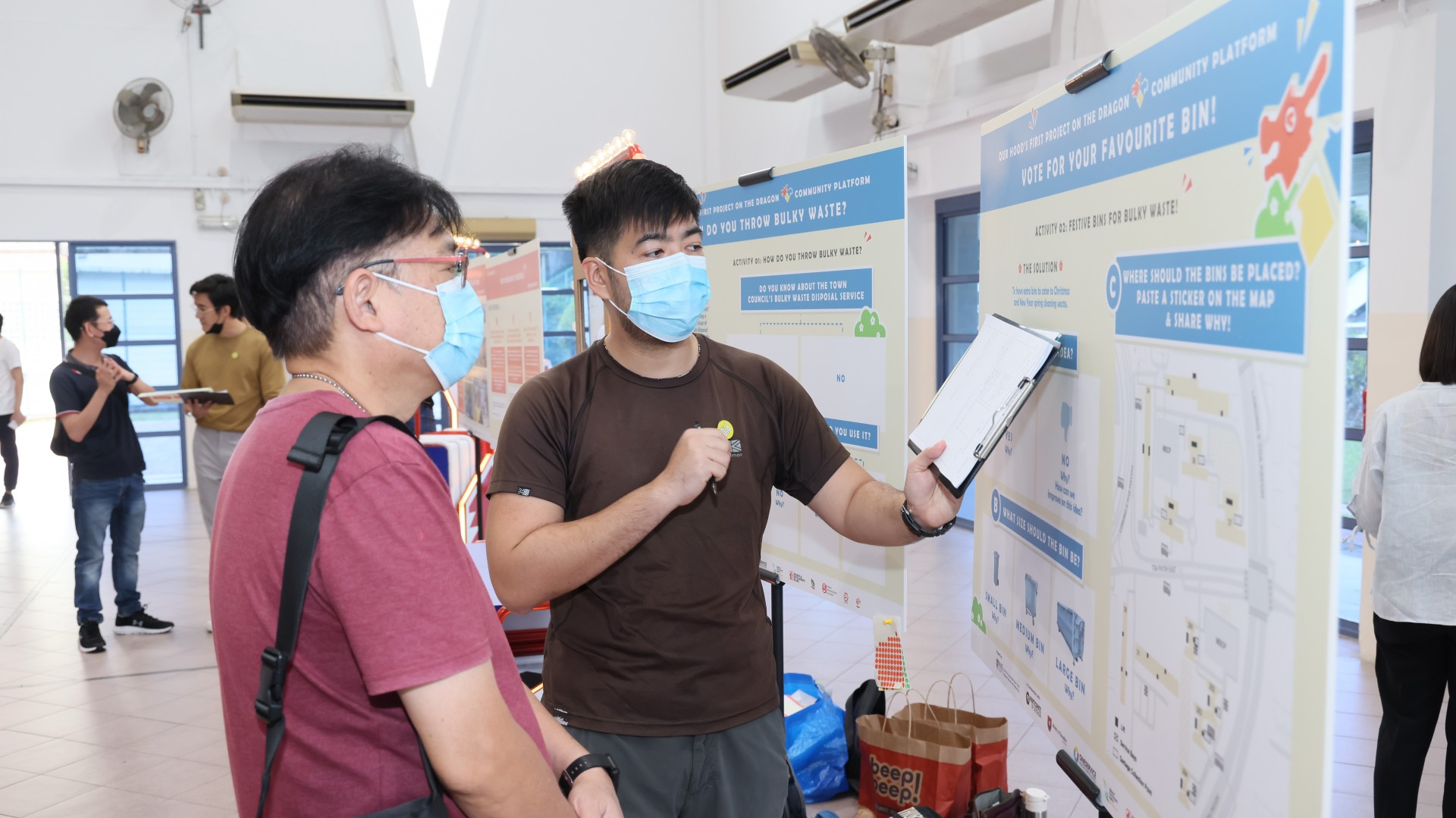Integrated community platform to tackle municipal issues piloted in Toa Payoh East

As part of the efforts to facilitate community-led solutions to tackle municipal issues, the Municipal Services Office (MSO) and the Centre for Sustainable Asian Cities under the National University of Singapore (NUS) College of Design and Engineering have worked with Toa Payoh East Constituency Office to launch the Dragon Heart Community Platform. This initiative arises from an ongoing research collaboration on fostering positive social norms and values, and facilitating community-led solutions in Singapore’s high-density housing environment.
Research collaboration on fostering positive social norms and co-solutioning
A key thrust under the Forward Singapore exercise has been to empower Singaporeans to take a greater stake in building an endearing home. This includes addressing municipal issues on the ground, and proactively shaping our living environment. The research collaboration, which is supported by the Ministry of Education (MOE), the Housing & Development Board (HDB), the National Parks Board (NParks), the National Environment Agency (NEA) and the Urban Redevelopment Authority (URA), seeks to understand the perceptions of residents on the role of the community in addressing municipal issues. It also seeks to understand how the Government can better engage residents to foster positive social norms and facilitate community-led solutions to municipal issues.
The study involved surveys, interviews, focus group discussions, pop-up events, culture probes and a co-solutioning workshop involving over 1,400 participants in Toa Payoh East. The key interim findings of the study are as follow:
- Residents want to make their neighbourhood a better place. There is a positive relationship between residents’ sense of place attachment and positive community behaviour. Residents with a stronger sense of attachment to their homes tend to provide more feedback to the authorities, perhaps due to a desire to build a better living environment.
- Having better relationships with neighbours is related to less inconsiderate neighbour behaviours. Higher levels of neighbourly relations are found to co-relate with lower levels of municipal issues such as littering and noise. Generally, neighbours with better relations have less conflicts and are better able to address conflicts amicably.
- Residents generally agree that it would be more effective for the community to work together to co-create solutions, especially when individuals are unable to resolve neighbourhood issues on their own. Existing neighbourhood chats and various community assets, such as volunteers and community-initiated projects can be leveraged for the resolution of neighbourhood issues.
Pilot three-pronged Integrated Community Platform to co-create municipal solutions
Based on these findings, the current phase of the study involves a pilot of the Dragon Heart Community Platform which is developed by the NUS research team to provide residents with the opportunity and resources to participate in community-led solutions to municipal issues in the neighbourhood. The three-pronged platform consists of the following:
- Dragon Idea Bank, an informative website with resources and ideas to address neighbourhood issues, co-solutioning toolkit and case studies of community-led projects to inspire resident co-solutioning
- Dragon Chat on WhatsApp, which allows residents to collect feedback among neighbours, contribute ideas and coordinate meetups for their co-solutioning projects, and
- Dragon Carts, three mobile physical carts equipped with tabletops, chairs and LED screens. These carts can be placed in neighbourhood areas to be used for group meetings, gather offline feedback from the community and provide a conducive space to promote community collaboration in the neighbourhood.
As a start, with the support from Bishan-Toa Payoh Town Council, the residents of Toa Payoh East Zone 6 will use the Dragon Heart Community Platform to lead a project in addressing the improper disposal of bulky waste in their neighbourhood – which is a key concern to the residents of Toa Payoh East Zone 6.
Senior Minister of State for National Development, Ms Sim Ann, said: “This study can potentially help us unlock more contributions and ideas from the community for a better living environment. I thank Toa Payoh East’s residents for gamely taking on this pilot, which is part of the Forward SG exercise. I hope the findings from this study can help us start similar initiatives across Singapore.”
Principal Investigator of the research project, Associate Professor Cho Im Sik from the Centre for Sustainable Asian Cities under the NUS College of Design and Engineering, said: “This research takes a holistic approach to understanding the background and factors involved in activating community participation in municipal issues, which have not been studied in a local context. Guided by our findings in the earlier phase of the research, we collaborated with the community to develop this platform to empower residents to resolve municipal issues together. The pilot project serves as a starting point for residents to work together to improve their living environment, and such efforts could help to foster positive social practices in the long run.”
Mr Saktiandi Supaat, Advisor to Bishan-Toa Payoh Grassroots Organisations, said: “We are happy to be involved in such a meaningful project. I am also very heartened by the enthusiasm and strong participation from our residents in Toa Payoh East. Their desire to work together collectively signifies the positive neighbourly ties that we have built over the years and share in our Toa Payoh East community.”
The NUS researchers will be evaluating the effectiveness of the pilot platform and provide recommendations on how the usage of the platform can be expanded to other neighbourhoods. The study is expected to complete in June 2023.




